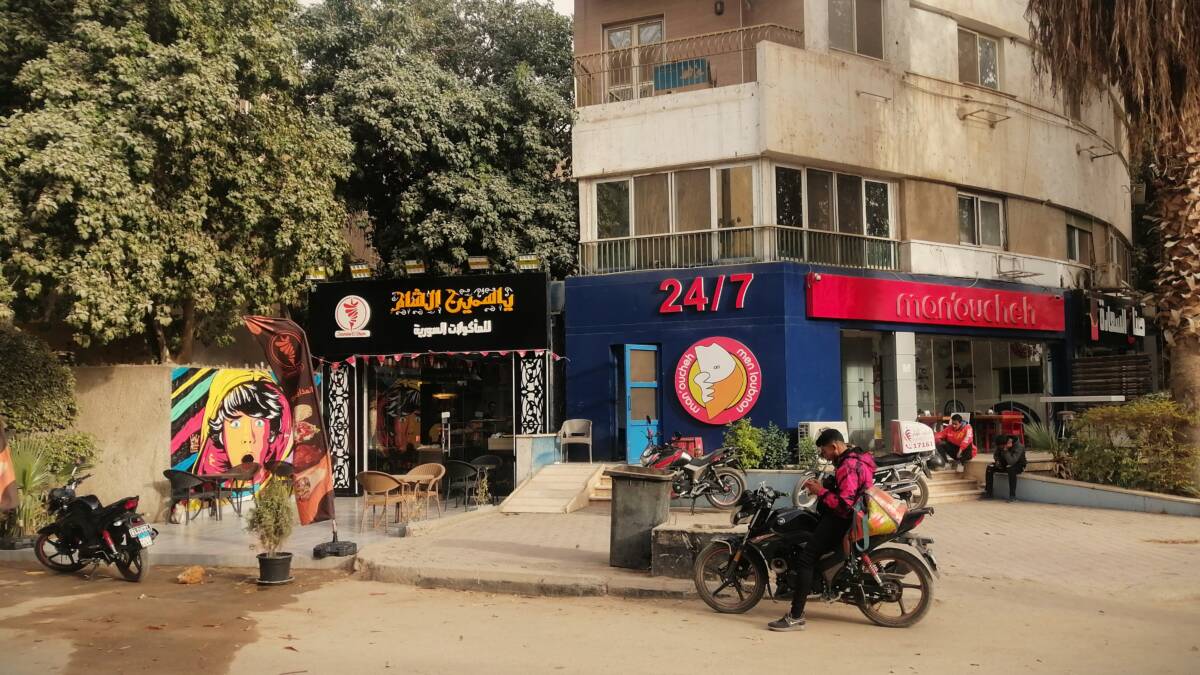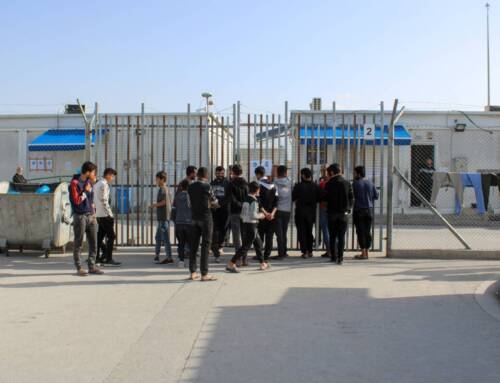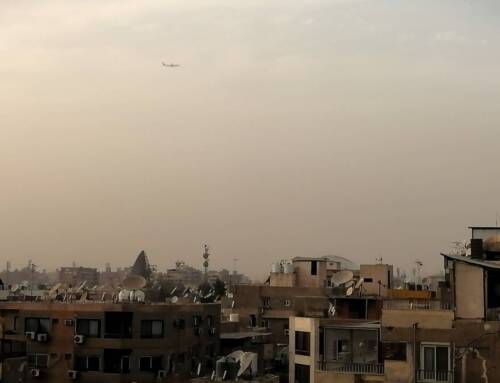Living and working as a Syrian in Egypt: A constant balancing act
Syrians, like other refugees in Egypt, face a host of barriers to residency and work permits. Pushed into the informal sector, they face exploitation and abuse. Their plight points to the darker side of Egypt for millions of foreigners.
15 April 2024
CAIRO – After earning a bachelor’s and a master’s degree in Business Administration from two top Egyptian universities, 32-years old Aref* thought he would easily find work as an accountant. While in school, he worked long hours as a waiter in a Syrian restaurant, and was eager for better-paid employment.
But for a full year after graduating in 2017, Aref could not land a job in his field, unlike other students from his cohort. The problem was not his diploma or the saturated Egyptian labor market, he realized, but his Syrian nationality.
“No one said it to my face, but once recruiters found out I was Syrian, they simply stopped getting back to me,” Aref, who moved from Damascus to Cairo in 2013, told Syria Direct.
He finally managed to land an accounting job in 2018 at a company owned by an acquaintance, but for a meager monthly salary: 2,000 Egyptian pounds (EGP) (around $112 according to the average exchange rate that year). While this salary was above the minimum wage of EGP 1,200 at the time (now EGP 3,500), it was well below the starting salary he expected, which he estimates should have been between EGP 4,000 and EGP 6,000.
Marwan*, a 32-year old civil engineer from Syria’s Homs countryside who arrived in Egypt in 2012 to finish his studies, faced the same challenges. “The years I spent studying for my master’s in Egypt were actually the best years of my life,” Marwan told Syria Direct. “But most of my problems emerged after graduation.”
Like Aref, Marwan has struggled to find a job matching his level of education. “As soon as recruiters find out that I am Syrian, they start asking for a work permit or other documents, and then they stop getting back to me,” he said.
Egypt is home to around 1.5 million Syrians, most of whom arrived after the 2011 revolution, fleeing war or political repression at home. But like other refugee communities in Egypt, most Syrians hold tourist or student visas and are not allowed to work. Many have been forced into the informal sector, which makes up at least 58 percent of the Egyptian economy. Wages are lower, hours are longer, regulation is absent and the threat of exploitation by business owners is omnipresent.
Many Syrians also struggle to renew their residency in Egypt due to increasingly predatory immigration laws requiring them to pay their administrative fees in foreign currency. Caught between the hammer of immigration and labor laws and the anvil of an economic crisis, many Syrians are cornered into increasingly precarious legal and economic positions. Their plight reveals the darker side of Egypt for millions of foreigners.
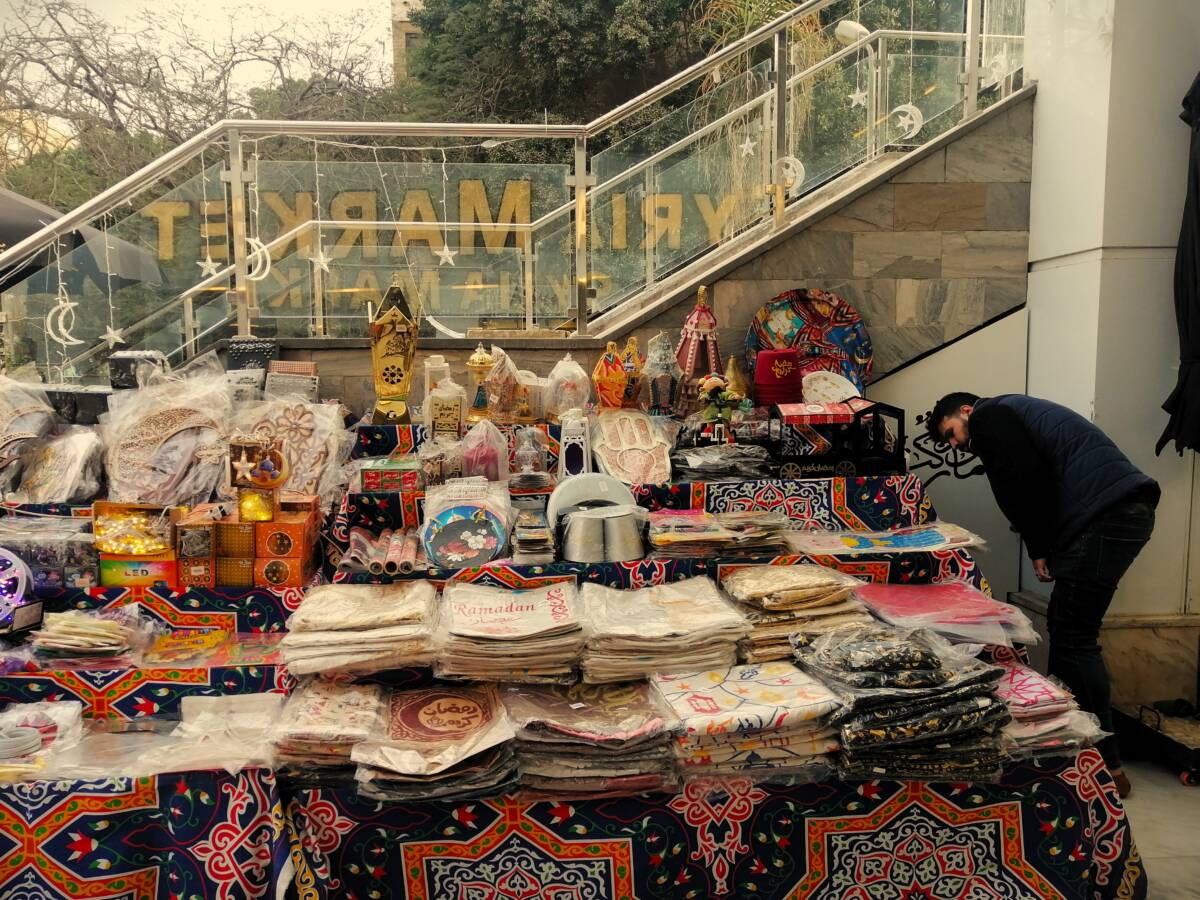
A vendor sells Ramadan decorations at Syria Market, a Syrian supermarket in Cairo’s southern Maadi neighborhood, 17/03/2024 (Lyse Mauvais/Syria Direct)
One community, different legal statuses
Only 10 percent of Syrians in Egypt, around 154,000 people, are registered with the UN Refugee Agency (UNHCR) as asylum seekers or refugees. Many who arrived in recent years opted out given the lengthy process, the perception that asylum-seeker status does not grant many benefits and the fact that Syrians can obtain residency in Egypt relatively easily.
“I met Syrians who have been here since 2010 or 2009, before the war and the revolution,” Abdallah*, a young Syrian who came from Latakia to Cairo in 2019 to find work and did not register with UNHCR, told Syria Direct. “Some people told me they have been here all those years without a residency, and sometimes without a passport.”
Those who choose to register do so for different reasons, including to be eligible for resettlement, like Aref, who was resettled by the UN agency to Canada in late 2023. But the prospects of resettlement are uncertain. While Aref received a reply on his case more than 10 years after applying, others never hear back. Reham*, a 52-years-old hammam manager who registered in 2013, says she has given up any hope of being resettled abroad.
Others register with UNHCR hoping for financial support, although most of those who spoke to Syria Direct said they never received it. Only one of them, Abu Hussein*, briefly received monthly grants of EGP 600 (around $64 at the average exchange rate in 2016) after arriving in Egypt in 2016.
Registering with UNHCR is also a way to earn temporary residency as an asylum seeker in Egypt, a status that some feel offers better legal protection than ordinary residency. “I don’t get any financial support or advantages from my yellow card,” Reham told Syria Direct, referring to the document issued by UNHCR to registered asylum seekers. “But I registered for my own protection as a Syrian citizen in Egypt, so that no one tries to arrest me or deport me.”
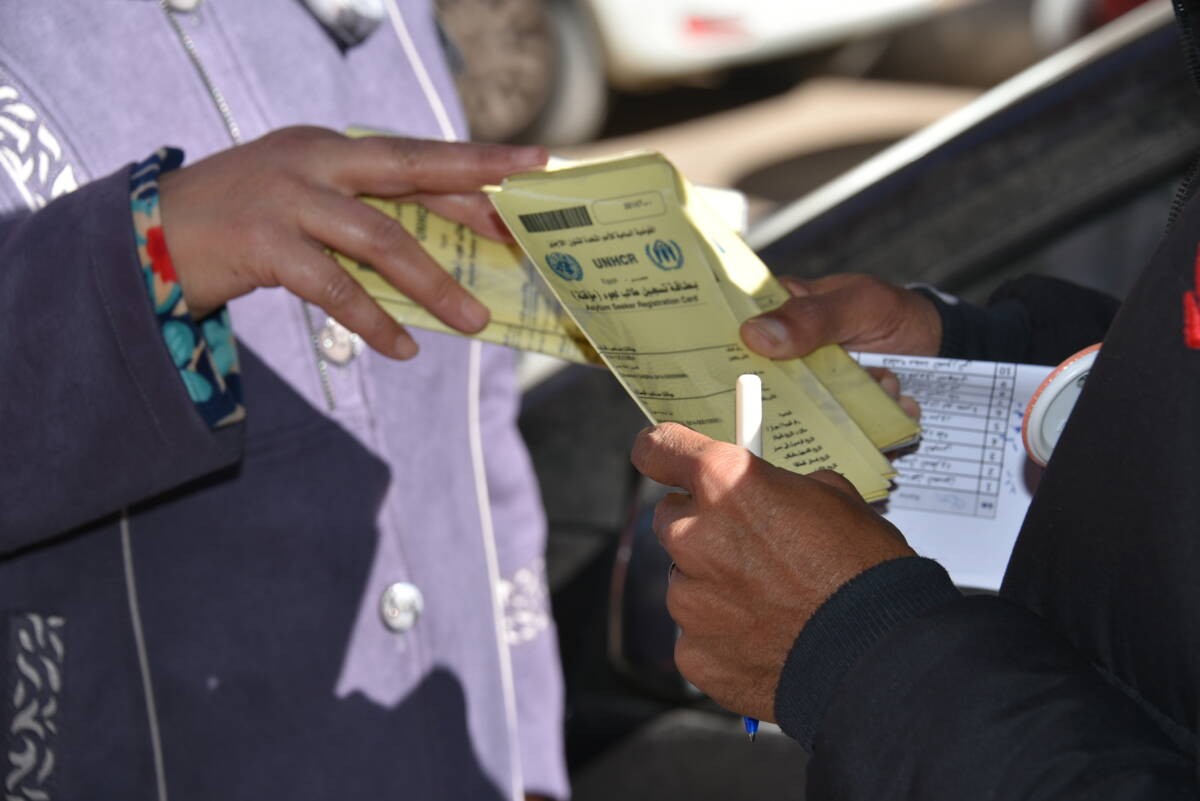
A refugee picks up their yellow card at the UNHCR office in Cairo, 01/02/2021 (UNHCR)
In 2013, UNHCR Egypt recorded a spike in asylum applications after a wave of arrests targeting Syrians with expired residency permits. The agency received nearly 30,000 applications over the course of a few weeks—corresponding to roughly 10 percent of the estimated Syrian population in Egypt that year. A UNHCR spokesperson explained at the time that the political environment for Syrians had until then been hospitable, and “Syrians had not felt the urgency to renew expired residency permits as required.”
Read more: In Egypt’s ‘Little Syria,’ a golden age dims
Before 2013, Syrians could fly to Egypt without a visa and apply for a renewable three-month residency within a month of their arrival. But these regulations changed after a military coup led by General Abdel Fattah al-Sisi that removed the elected president Muhammad Morsi from power. Egyptian authorities then started requiring that Syrians apply for a “security clearance”—which costs between $1,050 and $1,350 according to various estimates—before entering the country.
When that happened, Syrians began relying on irregular migration by way of Sudan. Abu Hussein, who came to Egypt in 2016, initially flew from Syria to Khartoum, where Syrians can still obtain a visa on arrival. After three months there, he paid a smuggler hundreds of dollars to ferry him overland through the desert and across Egypt’s southern border.
The route was known to be extremely dangerous, even deadly, but the alternative was unaffordable. “It would have been very hard for me to enter Egypt legally, because they were requesting a visa and security clearance that would have cost me over $1,000,” Abu Hussein said. Once in Egypt, he formalized his status through UNHCR and obtained a yellow card, which allows its holder to apply for temporary residency.
Complex residency system
Whether registered as refugees with UNHCR or not, Syrians living in Egypt have to apply for and regularly renew their residency to remain in the country legally. Those who are not eligible for the special three-year residency for registered refugees can apply for other permits, including a residency for foreign investors and business owners, one for students at Egyptian universities, one for spouses and relatives of Egyptian citizens and the most common type of residency: tourist residency.
Tourist residency must be applied for within one month of arriving in Egypt and grants its Syrian holders the right to stay for six months in the country—after which it must be extended. But Syrian tourist residency holders cannot travel out of Egypt freely: they must re-apply for a security clearance every time they re-enter the country.
While the document is not difficult to obtain, according to those interviewed by Syria Direct, the process can be long and cumbersome. The first hurdle applicants face is not from Egypt, but Syria: they must hold a valid passport. The Syrian passport is the most expensive in the world, costing more than $300 to renew every two years. “It costs a fortune, and for many of us in Egypt, it’s out of reach,” said Abu Hussein, who has not been able to renew his own.
Besides a valid passport and recent ID photos, Egyptian immigration authorities also request a rental contract and recent utility bills. But since some Egyptian landlords refuse to provide a written contract to their tenants to avoid paying taxes, Syrians resort to buying fake rental contracts and bills. A thriving market has popped up on social media, where specialized sellers offer forgeries. According to Aref, who went through the process several times, these can cost between EGP 600 and EGP 1000 ($13 to $21 at the current exchange rate of EGP 47 to the dollar).
Once all documents are submitted, it takes months for the application to be processed, during which applicants can’t leave their city or governorate. “I used to spend part of the year jailed in Cairo, waiting for the new residency to come through,” Aref recalled. “I suffered from deep anxiety and panic attacks over the fear that something would happen to me in the time it took me to renew my residency.”
Trapped in the informal sector
The main drawback of the standard “tourist” residency is that it does not allow its holder to work in Egypt. To do so, Syrians need a work permit, which is valid for one year or more and allows its holder to travel in and out of Egypt freely.
Few companies are willing to engage in the lengthy, expensive process needed to secure a work permit for their foreign employees. Its cost varies according to individual circumstances and, in some sectors, companies must pay at least EGP 15,000 per employee ($319 at the current exchange rate) in addition to other fees—including EGP 5,200 (around $110) for first-time applicants. The whole process can take between three and six months.
As a result, Syrians and other refugee communities are cornered into an uncomfortable economic situation. Recruiters at large companies disregard non-Egyptian candidates to avoid the hassle of sponsoring their work permits.
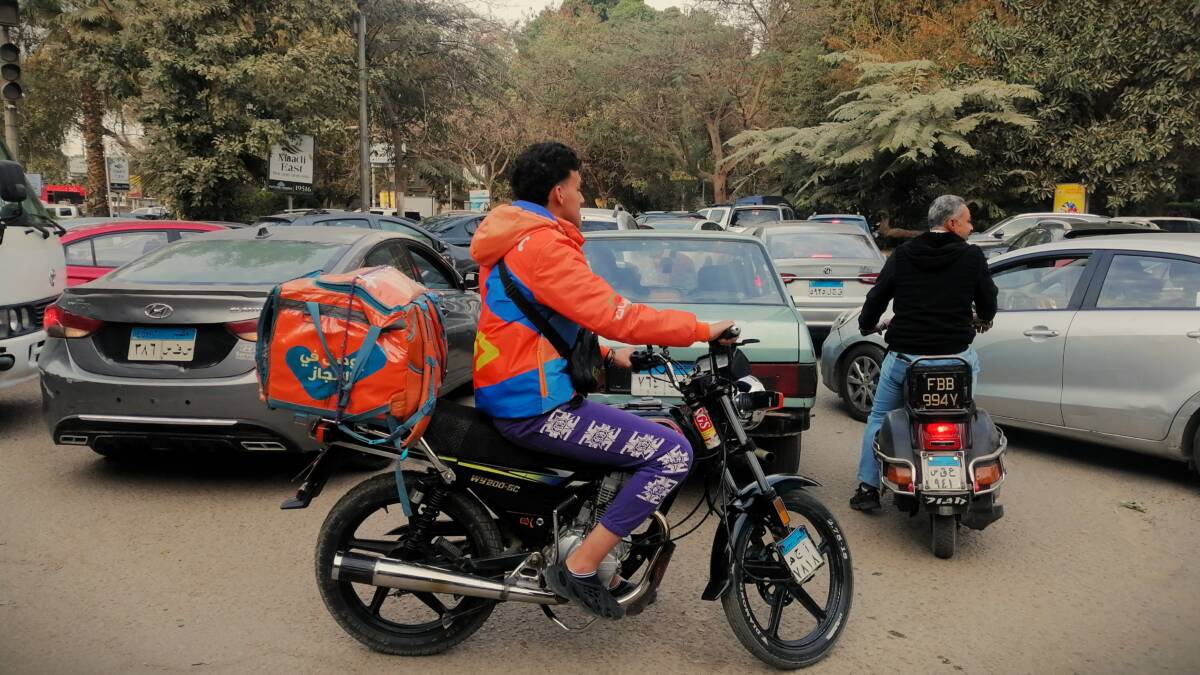
A food delivery worker navigates rush hour traffic in Cairo’s southern neighborhood of Maadi, one hour before Muslims break their fast during Ramadan, 17/3/2024 (Lyse Mauvais/Syria Direct)
This is a huge challenge for Syrians with university degrees, like Marwan. Despite holding the same degree as local candidates, Marwan feels discriminated against in the labor market. He was recently hired by a large engineering firm under a freelance status, which means he enjoys less benefits than other employees and can be fired with less notice. This setup also exempts his company from applying for a work permit on his behalf.
“All Syrians here are working without a permit, whether you’re talking about small roadside restaurants or large companies,” Marwan shrugged. “Everyone knows this is the case, and the government just looks the other way. It starts to be an issue when you try to rise up into bigger companies, though, because they won’t hire anyone who doesn’t have their papers in order.”
“The only option for Syrians is to work on the informal market,” Aref said with regret. “And in the informal market, people exploit you.”
Predatory practices
Syrians and other refugees in Egypt, including sizable Sudanese, South Sudanese and Eritrean communities, have long struggled to navigate Egypt’s opaque, complex and ever-changing regulatory landscape to secure their residencies—let alone work permits.
The collapse of the Egyptian pound in recent years—from EGP 6 in 2012 to EGP 31 to the dollar in early 2024—added another layer of difficulty. For a while, its true value was even lower than the official rate set by the central bank. On the black market, one dollar sold for between EGP 50 and EGP 70 in January and February 2024. When the central bank finally decided to float the currency on March 6, the official value plunged to EGP 49 to the dollar. It currently stands at EGP 47 to the dollar.
This dramatic currency collapse is linked to a liquidity crisis. Egypt’s foreign currency reserves dropped from $45 billion in February 2020 to $35 billion in January 2024, while its foreign debt more than tripled in the past decade.
In 2023, Egyptian authorities took a series of measures to beef up reserves, including a rule adopted in August requiring foreigners to pay their residency fees in “hard currency” (dollars or euros). Foreigners must now exchange dollars into EGP at the official rate through official banks or exchange offices. They also have to provide a recent exchange slip from the bank when paying their residency fees.
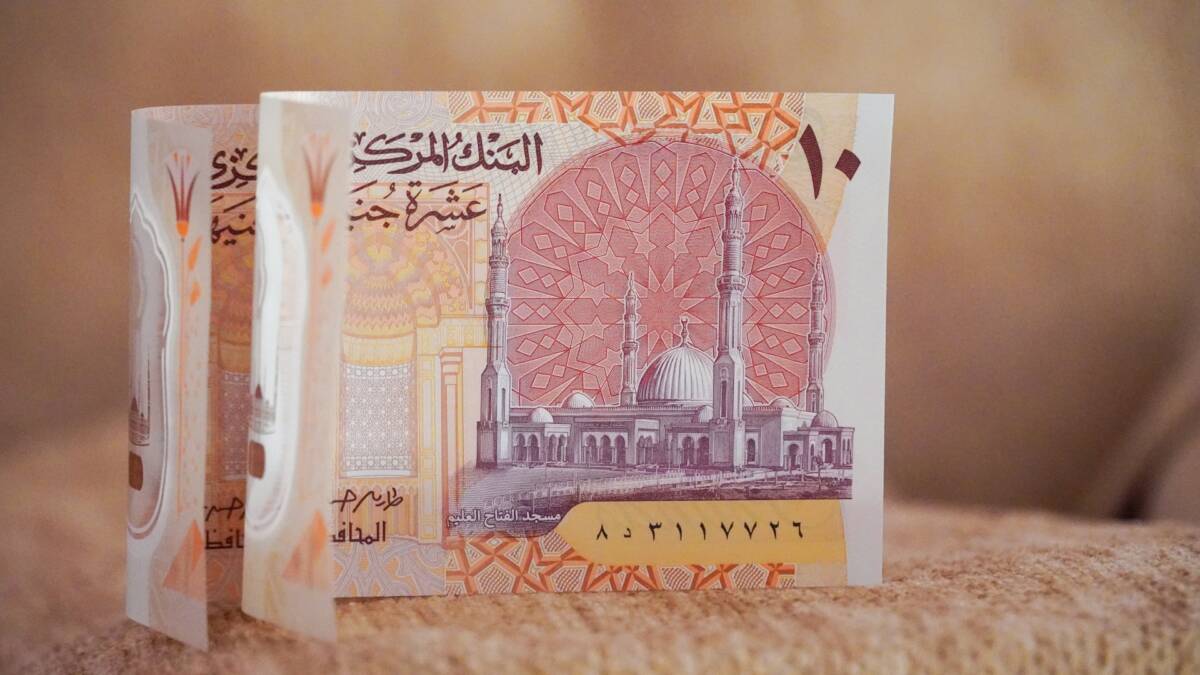
A 10-pound Egyptian banknote (Hamed Taha/Unsplash)
But since Egyptian banks, due to the currency crisis, simultaneously restricted the amount of dollars a person could withdraw to $250 a month—for those with access to a debit card—many foreigners for months had to resort to buying dollars on the black market. The price fluctuated constantly until March 6, but was generally much higher than the official rate.
“Refugees resorted to buying dollars on the black market at an inflated price, and then they have to sell them in the bank for a lower price just to pay their residency fees,” Aref told Syria Direct in February 2024, weeks before the artificial exchange rate set by the central bank was dropped. But exchanging money on the black market was illegal, and those caught buying dollars could face jail terms.
“Foreigners are asked to pay their fees in dollars, but they can get arrested for simply carrying them around. It’s absurd,” Aref said. Absurd as it may be, it encapsulates the precarious balancing act Syrian emigres and other non-citizens must perform to navigate Egypt’s ever-changing landscape—teetering on the fringes of legality.
*Given limitations on freedom of expression in Egypt, where people are routinely arrested and prosecuted on the basis of social media posts perceived as critical of the authorities, Syria Direct has used pseudonyms for all sources in this report. This was done to allow them to share their experiences freely, without concerns for their safety.
This report is the second in a three-part series on the experiences of Syrians in Egypt. Read part 1 here.

